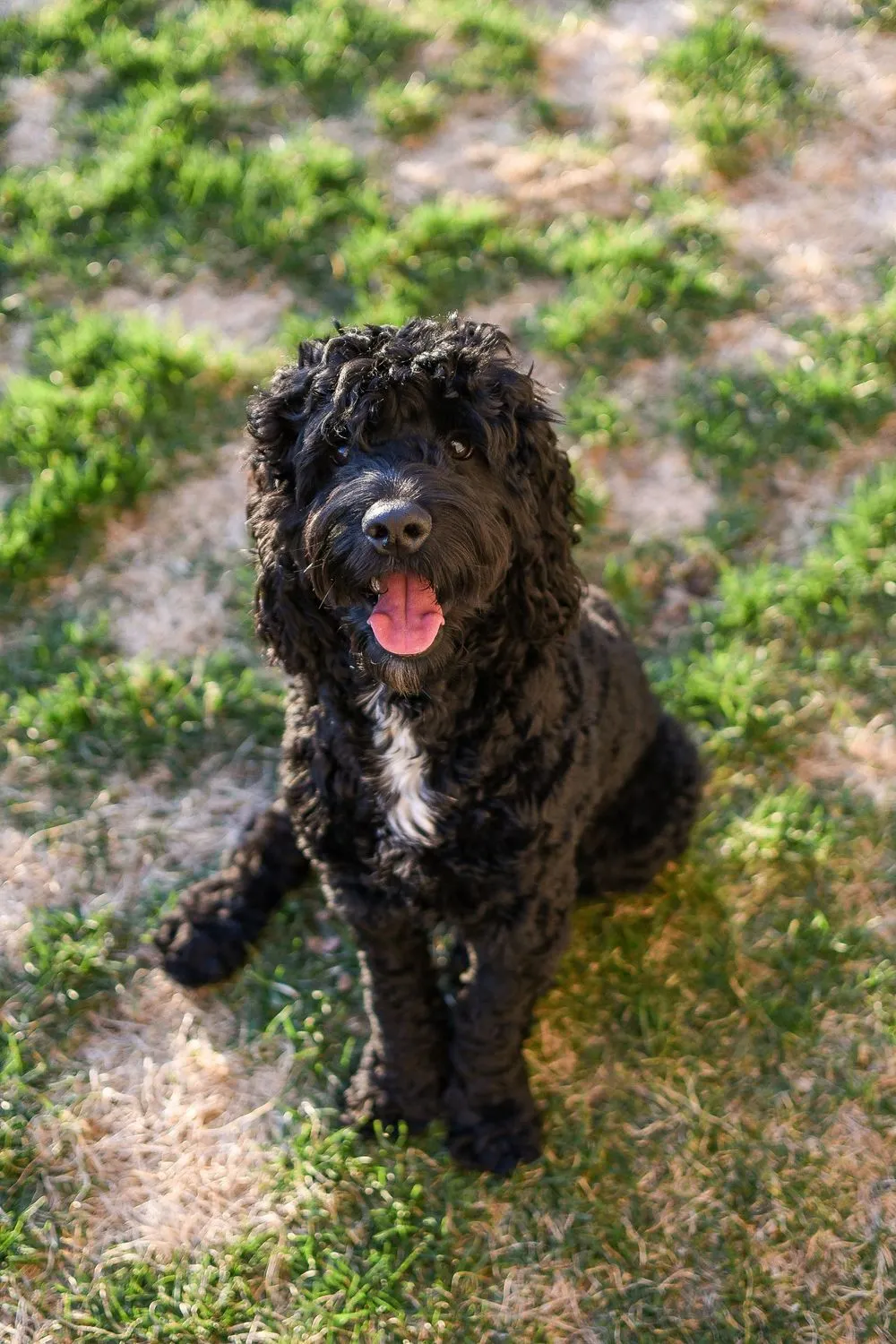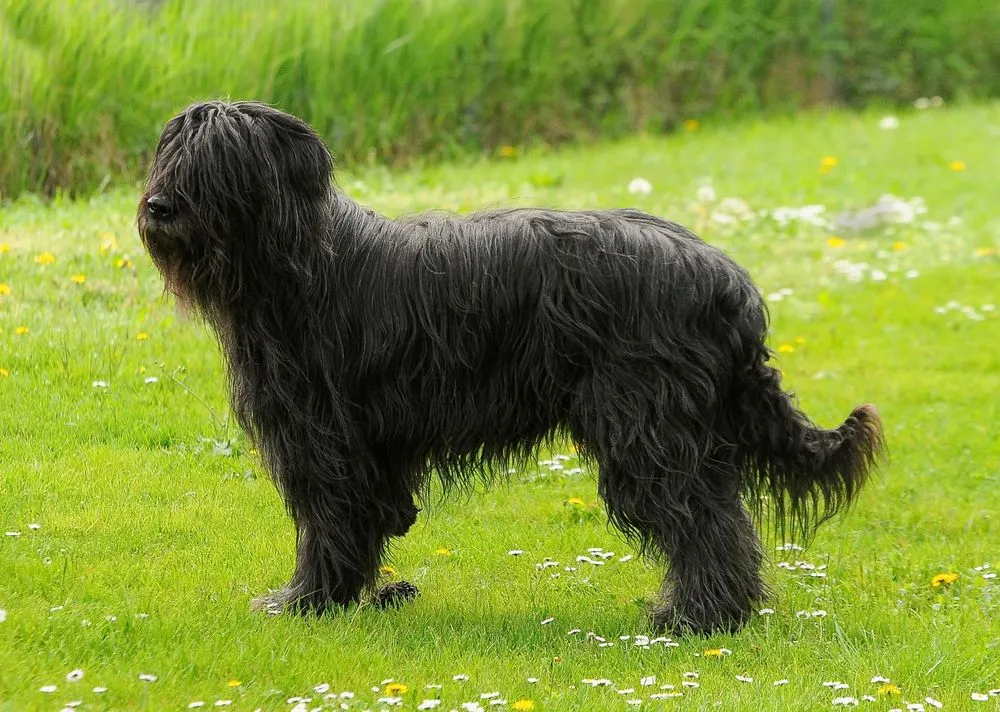Dive into the fascinating universe of the Portuguese Water Dog, a breed that embodies versatility, intelligence, and an unwavering dedication to work and family. This curly-coated marvel, with a rich history and endearing personality, has captured hearts worldwide. But what makes this aquatic expert so unique? Let's embark on a voyage to discover the many facets of this captivating canine.

A Brief Dive into History
Originating from the rugged coastlines of Portugal, the Portuguese Water Dog (or "Cão de Água" in Portuguese) has long been revered as a fisherman's best friend. These dogs weren't just casual companions. They played an integral role in the daily life of Portuguese fishermen. From herding fish into nets to retrieving lost tackle, these dogs were invaluable aquatic assistants. Their webbed feet, robust bodies, and keen senses made them natural swimmers, ensuring they were indispensable in marine tasks.
Characteristics: More than Just a Pretty Face
When you first lay eyes on a Portuguese Water Dog, it's easy to be smitten by their curly or wavy hair and expressive eyes. But beneath that cuddly exterior lies a powerhouse of strength and stamina.
A medium-sized dog with a sturdy build, the breed exhibits a keen sense of alertness. Their coat, often in shades of black, white, or brown, is uniquely suited to water tasks. It's water-resistant, helping to keep them dry during their aquatic adventures.
Training the Portuguese Water Dynamo
One of the standout features of the Portuguese Water Dog is its intelligence. These dogs are quick learners, eager to please, and innately curious. Training them is an absolute joy, provided you start early and remain consistent.
While they excel in obedience training, they also thrive in agility courses, showcasing their versatility in various dog sports. Due to their working heritage, they love tasks and challenges. Introducing games, puzzles, and regular training sessions can keep their minds sharp and satisfied.
Grooming Needs: Tangles, Curls, and Maintenance
You might think a breed with such a unique coat would be a nightmare to groom. Surprisingly, the Portuguese Water Dog's grooming needs are moderate. Regular brushing ensures their coat remains free from tangles. While they are often considered hypoallergenic due to their low-shedding nature, they do require occasional trims to keep their hair manageable.
Health and Well-being
Like all breeds, the Portuguese Water Dog has its share of health concerns. It's essential to be aware of potential issues like hip dysplasia, eye conditions, and heart problems. Regular check-ups, a balanced diet, and ample exercise can ensure your furry friend stays in tip-top shape.
The Perfect Temperament for Families
In one word? Affectionate. These dogs form close bonds with their families. They're known to be patient with children, making them excellent family pets. Their social nature means they thrive on interaction and play, and they're often friendly with other dogs and pets in the household.
Exercise Needs: Energy to Burn
Given their working heritage, it's no surprise that these dogs have energy in spades. Regular walks, play sessions, and, if possible, swimming can keep them happy. They excel in dog sports and often love fetch games, agility training, and of course, anything related to water.
Adopting a Portuguese Water Dog
While they're increasingly popular due to their unique characteristics and even a stint as the First Dog in the White House, adopting a Portuguese Water Dog should be a well-thought-out decision. Understanding their needs, temperament, and care requirements can ensure a harmonious relationship.
Pop Culture and the Portuguese Water Dog
If you've been keeping tabs on popular pets of notable personalities, you might recognize the Portuguese Water Dog as the chosen breed of former U.S. President Barack Obama. Bo and Sunny, the two Portuguese Water Dogs that graced the White House, undoubtedly added to the breed's popularity.
Portuguese Water Dog vs. Other Water Breeds
When it comes to water-loving canines, the Portuguese Water Dog certainly isn’t the only one in the pool. Breeds like the Labrador Retriever and the Newfoundland are also renowned for their aquatic abilities. However, what sets the Portuguese Water Dog apart is its specific historical function of assisting fishermen in netting fish and retrieving gear. Their size, agility, and tireless energy made them ideal for such tasks, whereas breeds like the Newfoundland played more of a lifeguard role.
Challenges of Ownership
While they are undeniably charming and versatile, owning a Portuguese Water Dog isn't without its challenges. Their high intelligence means they can sometimes be stubborn. If not given a proper outlet for their energy, they can resort to undesirable behaviors like chewing or digging. Socialization from a young age is crucial, as is consistent training and boundaries.
Moreover, prospective owners should be prepared for the time and effort required for grooming. Though they might not shed much, neglecting their coat can lead to severe matting.
Community and Support
The good news for aspiring and current Portuguese Water Dog owners is the strong community and resources available. Various clubs, organizations, and online forums are dedicated to this particular breed. Whether you're looking for training tips, grooming advice, or simply want to share your experiences, you'll find plenty of support and camaraderie within the community.
Living with a Portuguese Water Dog: A Day in the Life
For anyone considering adding a Portuguese Water Dog to their family, it's essential to know what a typical day might look like. These dogs are vivacious, filled with boundless energy, and thrive on routine.
Morning Play and Breakfast Rituals
With the sun's first rays, you might find your Portuguese Water Dog nudging you for some early playtime. They're not the kind to laze around in bed, especially when there's a day full of activities ahead. After some fetch or a brisk morning walk, it's breakfast time. They relish their meals and, given their active nature, require a nutritious diet to keep up with their energy demands.
Mid-day Training and Socializing
Training isn't just about obedience; it's also a form of engagement. A mid-day training session, even if it's just for 15 minutes, can mentally stimulate your dog, keeping them sharp and attentive. This can be coupled with a visit to a dog park, where they can socialize with other dogs. Remember, the Portuguese Water Dog temperament is generally friendly, so they often enjoy these outings immensely.
Water Adventures
If you live near a water body, an afternoon swim can be a delightful activity. These dogs are natural swimmers, and the water is their playground. Whether it's chasing after floating toys or merely paddling around, they can spend hours in water and never get bored.

Evening Wind Down
Like any other dog, after a day filled with activities, they love to curl up beside their favorite humans. While they're active, they're also incredibly affectionate. Some snuggle time on the couch or gentle petting can be the perfect way to end their day.
The Journey of Training and Growth
Owning a Portuguese Water Dog isn't just about meeting their physical needs; it's also about understanding their mental and emotional requirements. These dogs mature relatively slowly, staying puppy-like in their behavior for an extended period. This means training is an ongoing journey. While they might master basic commands quickly, thanks to their intelligence, refining those skills and introducing advanced training can be both challenging and rewarding.
Breeding and Conservation
With popularity comes responsibility. As the breed gains more recognition, it's essential to promote responsible breeding practices to ensure the health and longevity of the Portuguese Water Dog. Reputable breeders prioritize health tests, temperament, and lineage. For those considering getting a puppy, it's crucial to do thorough research and choose breeders who uphold these standards.
Moreover, with a history as rich as theirs, conservation of their legacy, their stories, and their lineage is paramount. Several organizations worldwide work towards preserving the purity of the breed and educating potential owners about their unique needs and characteristics.
The Health and Well-being of the Portuguese Water Dog
It's not just the history, temperament, or appearance that attracts people to the Portuguese Water Dog. Their overall health and the commitment of breed enthusiasts to maintain a robust gene pool make them a breed worth considering for potential dog owners. But like every breed, they come with their own set of health considerations.
Common Health Concerns
While Portuguese Water Dogs are generally healthy, they're prone to certain genetic health problems. Common concerns include hip dysplasia, a condition where the hip joint doesn't develop correctly, leading to arthritis. They can also face eye conditions like progressive retinal atrophy. Regular check-ups and being alert to any signs of discomfort or pain can help in early diagnosis and treatment.
Another concern is storage disease, a rare metabolic disorder. Breeders usually test for this condition, but it's always a good idea for potential owners to be aware.
Diet and Nutrition
Feeding a balanced and nutritious diet is paramount for their health. Given their active nature, they require food rich in protein and essential nutrients. Owners should be wary of overfeeding, as obesity can lead to other health problems. Also, ensure they have constant access to fresh water, especially if they've been active or out in the sun.
Exercise and Mental Stimulation
Physical exercise is vital, but so is mental stimulation. Incorporating puzzle toys, agility training, or even simple fetch games can keep their mind sharp. They thrive on challenges and tasks, so introducing new games or training routines can be immensely beneficial.
The Legacy of the Portuguese Water Dog in Modern Times
The Portuguese Water Dog, with its rich history, has seamlessly integrated itself into modern times. From being fisherman's assistants to accompanying presidents, their journey is nothing short of remarkable.
In contemporary society, they've found roles beyond being mere pets. Their intelligence, trainability, and keen senses make them excellent candidates for therapy and assistance roles. Their hypoallergenic coats also mean they can be with people who usually can't tolerate dog hair, making them even more versatile in therapeutic settings.
Breeding Ethics and the Way Forward
As the breed gains in popularity, the importance of ethical breeding cannot be stressed enough. Overbreeding or breeding without proper health checks can lead to a decline in the overall health of the breed. Prospective owners should always opt for breeders who adhere to strict ethical standards and prioritize the well-being of the dogs over profit.

Living the Best Life with a Portuguese Water Dog
Having a Portuguese Water Dog isn't just about pet ownership; it's an experience that permeates every aspect of one's life. From their early days as puppies to their golden years, here are some aspects of sharing a life with this majestic breed.
Grooming the Luxurious Coat
The iconic curly or wavy coat of the Portuguese Water Dog requires consistent care. While they're known to be low-shedding, they're not entirely maintenance-free. Regular brushing ensures that the coat remains tangle-free and reduces any potential matting. Every couple of months, they might require a trim to keep them looking their best, especially around the eyes, ears, and paws.
Bathing should be done as needed, but it's crucial not to overdo it. Overbathing can strip the coat of its natural oils, leading to dryness and irritation. Using dog-specific shampoos and conditioners can help maintain the coat's natural shine and health.
Forming Bonds and Social Skills
The Portuguese Water Dog is known for its loyalty and affectionate nature. They form strong bonds with their families and can be especially good with children. However, early socialization is key. Introducing them to various environments, people, and other animals while they're young can ensure they grow up to be well-adjusted adults.
Participating in group dog training classes or taking regular trips to the dog park can also help them hone their social skills, ensuring they interact amicably with other dogs and humans.
Tackling Separation Anxiety
One challenge that some Portuguese Water Dog owners might face is dealing with separation anxiety. Given their history of working closely with humans, they can sometimes struggle when left alone for extended periods. This can manifest in various ways, from destructive behavior to excessive barking.
To address this, it's crucial to create a consistent routine. Crate training, providing interactive toys, or even considering a second pet for companionship can help alleviate some of the anxiety. Additionally, doggy daycare or hiring a dog walker for mid-day visits can give them the attention and stimulation they crave.
Celebrating the Legacy: Events and Competitions
Across the world, the Portuguese Water Dog has carved a niche for itself in various canine events and competitions. Their agility, intelligence, and trainability make them top contenders in obedience trials, agility courses, and even water-based events that harken back to their fishing roots.
Such events not only showcase the breed's capabilities but also strengthen the bond between the dog and the owner. It's a testament to the centuries-old legacy of the breed, a celebration of their storied past and promising future.
The Promise of Tomorrow
The future shines bright for the Portuguese Water Dog. With growing awareness about the breed and a committed community of breeders and enthusiasts, they continue to thrive. As more people discover the joy of sharing their lives with these incredible dogs, the legacy of the Portuguese Water Dog is set to sail smoothly into the horizon, making waves and capturing hearts along the way.
Conclusion:
The Portuguese Water Dog is a marvel of history, adaptability, and companionship. With origins tied to Portuguese fishermen, these dogs have sailed from working the seas to gracing households with their loyalty and intelligence. Their distinct curly or wavy coat demands attention, but it's their character that truly wins hearts. As they form deep bonds with families, early socialization becomes pivotal. The challenges, like dealing with separation anxiety, are eclipsed by the joy they bring. Their prowess shines in various canine events, a nod to their illustrious past. Embracing the world of the Portuguese Water Dog promises a journey of discovery, commitment, and unparalleled love.
Frequently Asked Questions (FAQs) about the Portuguese Water Dog
- What is the origin of the Portuguese Water Dog?
- The Portuguese Water Dog originated in Portugal and was primarily used by fishermen to herd fish into nets, retrieve lost equipment, and even carry messages between boats.
- How is the temperament of the Portuguese Water Dog?
- They are known for their intelligence, loyalty, and affectionate nature. They're energetic, love to play, and form strong bonds with their families.
- What kind of coat does a Portuguese Water Dog have?
- They have a unique, water-resistant coat that can either be curly or wavy. This coat is also known to be low-shedding, making it popular among allergy sufferers.
- How do I groom my Portuguese Water Dog?
- Regular brushing is essential to prevent tangles and mats. They might also require a trim every couple of months. Bathing should be done as needed, using dog-specific shampoos and conditioners.
- Are Portuguese Water Dogs good with children?
- Yes, they are often great with children and can be very gentle. However, early socialization and training are crucial to ensure positive interactions.
- Do Portuguese Water Dogs suffer from separation anxiety?
- Some can struggle with separation anxiety due to their history of working closely with humans. Creating a consistent routine and providing interactive toys can help address this issue.
- Can Portuguese Water Dogs participate in canine events and competitions?
- Absolutely! Their agility, intelligence, and trainability make them top contenders in various canine events, from obedience trials to water-based competitions.
- What are the common health concerns in Portuguese Water Dogs?
- While they are generally healthy, they can be prone to certain genetic conditions like hip dysplasia, progressive retinal atrophy, and a rare metabolic disorder called storage disease.
- What should I feed my Portuguese Water Dog?
- A balanced and nutritious diet rich in protein and essential nutrients is recommended. It's essential to avoid overfeeding and ensure they have access to fresh water.
- Why are Portuguese Water Dogs considered versatile?
- Their rich history as fishermen's assistants and their adaptability to both historical and modern roles, including therapy and assistance, showcase their versatility and intelligence.




